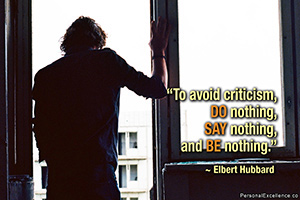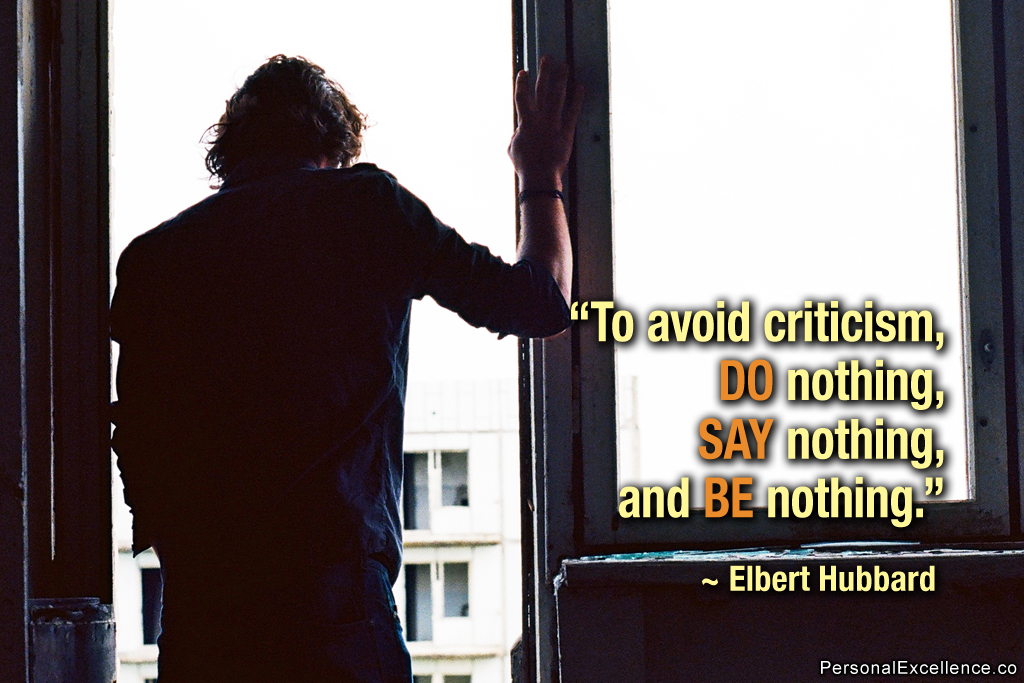
(Image: Brett Jordan)
A nurse who cared for dying patients in the last weeks of their lives recorded the most common regrets among them. The top ones were wishing they didn’t work so hard, wishing they had the courage to express themselves, and wishing they had let themselves be happier.
When death becomes imminent, we often get striking clarity on what’s important and what’s not. Here are the top 5 regrets of the dying, as identified by former palliative nurse Bronnie Ware, and how we can use these insights to improve our life now.
Regret #1: I wish I’d had the courage to live a life true to myself, not the life others expected of me
Bronnie says, “This was the most common regret of all when people realized that their life is almost over […]. Most people had not honored even a half of their dreams and had to die knowing that it was due to the choices they had made or not made.”
Have you ever been told what to do in your life, even though it isn’t what you really want? For example:
- Being told to pick a certain course of study because it’s popular.
- Being told to pick a certain career because it’s lucrative.
- Being told to get married by X age.
- Being told to have kids after marriage, which I wrote about in Stop Asking Couples When They’re Having Kids.
I remember when I first told others about my plan to quit my well-paying corporate job and start my personal development business, everyone around me reacted negatively, including my parents and friends. “You’re going to regret it,” a good friend said. “NO! Starting a business is very risky. Your job pays you so well and you get pension,” my parents said. “You shouldn’t quit your job. It’s the recession now and it’ll be hard to find another job,” my then-colleagues said.
While I understood what they were saying, what I was doing (selling skincare and consumer goods) wasn’t my passion — helping others to grow is. Even though my job paid very well, it wasn’t what I wanted to do. So I quit my job and started Personal Excellence. With no help or support network, I built my blog from zero to over a million pageviews a month, worked with thousands of clients to achieve their goals, and was interviewed regularly on TV, print, and radio for my work. (I detail my journey in my passion series.)
While others’ expectations often come from a good place, ultimately your life is yours to live. Don’t pick a certain career because others tell you to do so. Don’t rush into marriage because your friends are getting married. And definitely don’t have kids simply because your parents and in-laws keep asking you to do so.
You may be on a different path, and that’s okay. All of us have our unique paths in life. Don’t worry about what others are doing, but work on staying true to yourself. What are your goals? Your dreams? Have you been putting them on hold? How can you start working on your goals and needs now, even if in a small way?
Regret #2: I wish I didn’t work so hard
I grew up in Singapore where work is equated with the individual — there is little to no concept of self. Conversations usually start this way, “What do you do? What do you work as?” There is a strong national rhetoric that to live is to work, and one should work until they die. Singapore is the most overworked country in the Asia Pacific[1], and in a research by Sleepseeker, it is also the most tired nation in the world.[2]
So when I started working in my 20s, work naturally became the core of my being. I would work non-stop from day and night, sleep, and then continue this the next day. Whether it was my corporate job (pre-Personal Excellence) or my business, I would do well and excel in it.
While it was fulfilling to see the fruits of my labor, it became clear that some parts of my life don’t improve by simply working hard in my job. For example, Family. Romance. Health. Ignoring them for a long time causes them to decline. Sometimes, there are things that can’t be recovered when gone, for example when you miss your child’s growing up years, or when your loved ones pass away.
When you thrive at work, it gives you a sense of accomplishment and even helps you in your financial goals. But as you put more and more time into work, to the point of extremity, there is a point of diminishing returns where the work gains don’t fulfill you as much.
Elon Musk is the perfect example of modern-day workaholism. He works 120-hour weeks[3][4] and is frequently seen as the emblem of American success. But he admits to needing a sleep drug to sleep[5], suffers from stress-related vomitting and insomnia[6], and has a turbulent personal life (he is divorced three times; he never talked to his first wife about the death of their first child[7]; his eldest daughter recently disowned him[8]; and he is currently in a custody battle with an ex-partner over the parental rights of their three children[9]).
Are these purely the result of overworking? Some clearly are. Would these issues be there if he had spent some time on these life areas outside of work? Chances are they would be at a lesser intensity. Some issues may not even exist.
There are areas of our lives that cannot be fulfilled by simply working. I have created a life wheel tool (below) that lets you assess how you’re currently doing in your life, beyond just work. It reflects the 10 key areas of your life, such as Career, Finance, Family, Health, Contribution, and Self. I use this with my 1-1 coaching clients and it’s extremely helpful to see if their life is off balance.

(Image: Personal Excellence)
Here’s a quick exercise for you:
- Rate yourself in each area on a scale of 0-10, where 0 is the lowest and 10 is the highest.
- Mark the scores on the diagram and connect them with a continuous line.
- What shape did you get? Is it a constricted web with low scores on many fronts? A lopsided web with high scores in some areas and low scores in others? Or a broad circle with many high scores, or even a full circle?
- Evaluate the shape of your life wheel. It reflects how you’re currently doing in your life. A constricted web means many restrictions, while a broad circle means you’re doing well. A lopsided web means your life is off balance.
- How are you happy with your life wheel shape? Why or why not?
- How are you doing in each area? Which are your lowest areas? Which are your highest?
- Have you been neglecting your non-work areas like Family, Love, Social, Self, and Health? If so, how can you start working on them?
(For those of you with Live a Better Life in 30 Days, you may recognize the life wheel from Day 1’s task. I’m working on an update now and will share more soon — subscribe to my newsletter to be in the loop of updates!)
Regret #3: I wish I’d had the courage to express my feelings
Bronnie says, “Many people suppressed their feelings in order to keep peace with others. As a result, they settled for a mediocre existence and never became who they were truly capable of becoming. Many developed illnesses relating to the bitterness and resentment they carried as a result.”
The fear of expressing ourselves often comes from a fear of others’ reactions. Such as the fear of being judged. Fear of being rejected. Fear of being criticized. I understand that because in my culture (I’m Chinese), conformance is quintessential. You’re expected to keep quiet to be accepted, otherwise you’ll be frowned upon, criticized, or an outcast. Yet in doing so, you become a yes-person, you suppress your true self, and you never get heard.
Ultimately ask yourself — does it matter what others think of you? Because at the end of the day, you can’t please everyone. When you stay silent out of fear of how others would react, you are just suppressing your real self and your wants and needs, out of fear of offending others. But if someone is so easily offended by you, and the relationship is contingent upon you hiding your views, then is this really a relationship you want to have?
Some people may be unhappy or dislike you when you speak your mind. That’s fine. Don’t aim to please everyone — it’s a terrible goal. Sometimes people’s unhappiness has nothing to do with you — it’s to do with their own pain in their lives.
Choose your battles. Speak up on the things that matter to you. For the other things, if they’re not that important, let them go. Start doing that with your friends, family, and colleagues. If there’s something important to you, speak up. If the person cares about you, they will want to hear what you have to say. If they are not receptive, then perhaps it’s a sign that this relationship is not compatible and it’s time to let it go.
Similarly, saying no is an important skill as you help others understand your boundaries. While we may want to say yes all the time to make others happy, remember that saying no lets others know your limits. Read: How To Say No To Others
Regret #4: I wish I had stayed in touch with my friends
This regret is interesting because with the patients Bronnie cared for, they grew up in an era when there were no mobile phones or social media, and it was difficult to stay in touch. These days, we have Facebook, Instagram, and Whatsapp, and it’s so easy to keep in touch. You can simply add someone as a friend on Facebook and see their profile updates, or send a SMS or Whatsapp message and start a conversation that way.
Yet staying in touch remains a challenge as we are now overwhelmed as a society. We are overwhelmed by life’s continuous challenges, be it Covid, work pressures, raising young children, caring for older parents, or pressures in the family. And this leaves us with little to no time for our friendships.
Can you identify the friends who are important to you? Friends who have been there for you in life. Friends you have a genuine connection with. Friends you care about. Friends who have been with you through ups and downs.
When you get a moment and a breather, take some time to keep in touch. Maybe send them a message right now. Send a text message to them to check how they are doing or send some good wishes. For example, “Hi X, I was just thinking about you. How are you doing?” Just send a message and see what comes out of it. Who knows, maybe he/she is thinking about you too. ♥
Regret #5: I wish that I had let myself be happier
Bronnie shared this story in her book (Top Five Regrets of the Dying):
Rosemary was raised in a small town with a family name that meant something. As a young woman, she played her part and married young to a man everyone respected. For the next couple years, she endured physical and mental abuse, and eventually found the strength to escape once and for all. After her divorce, in a desperate hope to protect her family name, she left her hometown and moved to the city.
Rosemary’s need for approval and self-validation drove her success in a male-dominated corporate world. She became an executive in a global corporation, and the first woman to hold such a role in her city. She was a product of her environment — demanding, controlling, and intimidating. While she loved the power and respect, it didn’t help her when she became ill. She was scared, lonely, and unhappy. After her failed marriage, she never let anyone get too close and never felt she deserved to be happy.
Facing death provided clarity. She regretted being mean to everyone and admitted she didn’t know how to be happy. Slowly, and with Bronnie’s encouragement, she began giving herself permission. Sneaking smiles and quiet laughter, as if they were bad words. She became kinder. She began to like herself more. She even joked about how much of a tyrant she was in the past. She realized that we all deserve to be happy and must choose to be. She forgave herself, finally allowed herself to be happy, and passed on.
“I wish I’d let myself be happier. What a miserable person I have been. I just didn’t think I deserved to be. But I do. I know that now.” — Rosemary
For many of us, happiness may be an elusive pursuit. “I can only be happy if I do X and Y,” we tell ourselves.
It’s not our fault really — many times these are stories that society tells us, and we are just doing what we are told. In Rosemary’s case, she initially thought that happiness came from being married to a man that everyone respected. When it didn’t happen, she then worked on her career, which resulted in power and respect, but it still didn’t bring her happiness. It was only when she gave herself permission to be happy that she finally became happy and passed on.
What does it mean to be happy? Looking up the Cambridge dictionary[10][11], it means feeling pleased or satisfied. Being cheerful. Glad. Delighted. Contented. In many cultures, we’re told that we can only be happy when we do as we’re told. For example, achieving academic success. Getting a well-paying job. Achieving career success. Being materially wealthy. Marrying a respectable person. Marrying someone of the same race (or religion or culture or background). Having kids. Having more kids. Having a healthy child. Raising a successful child.
Many of these are tied with the first regret, which are to live up to expectations that others have of us, and the implicit message being we’re not worthy if we don’t achieve them.
Maybe it’s time to release ourselves from these expectations. Achieving academic success, career success, or material wealth doesn’t guarantee happiness. Marrying someone who is wealthy or of a certain status doesn’t guarantee happiness. Having one, two, or many kids, and raising kids dogmaticly in a certain way doesn’t guarantee happiness. Some people slough away to achieve these all through their lives and they’re still unhappy.
Happiness can start now — if you give yourself the permission to be happy. Release yourself of others’ expectations. Release yourself of your expectations. Find happiness in the little things. Whatever difficulty you may be facing now, there is a way out. Don’t give up. I hope you’ll be able to find a solution soon, and work through whatever you’re facing. And I’ll do my best to support you through my work at PE.
Related posts:
- Regrets of the Dying [BronnieWare.com]
- The Life Wheel (Day 1 of Live a Better Life in 30 Days — I’m working on an update now and will share more soon — subscribe to my newsletter to be in the loop of updates!)









 Thanks for reading. If you like my free articles, join my private email list and get my latest updates and articles sent right to your inbox.
Thanks for reading. If you like my free articles, join my private email list and get my latest updates and articles sent right to your inbox.